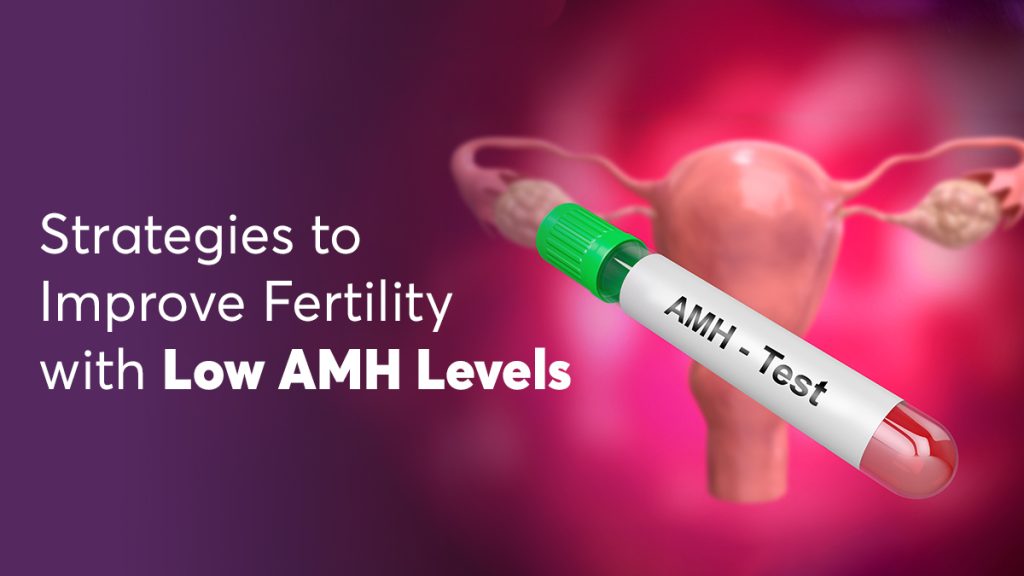Planning on conceiving but unsure where to start? What you should know is that several factors impact this, including your fertile window, sexual activity, egg and sperm health, and even hormones. The Anti-Mullerian Hormone (AMH) is one such hormone, which determines the ovarian reserve as well as its quality. Read on to know the significance of good AMH levels and how to achieve them to get pregnant.
Understanding AMH and Fertility
AMH indicates the number of eggs left in the ovaries. The reserve is depleted as you age, and ovaries start reducing the number of eggs released each month. The amount of reserve determines the fertility potential and natural conception. As the number of ova (eggs) decreases, fertility decreases. Lifestyle, environment, and reproductive issues may also affect AMH levels. Actually, low AMH treatments have proven useful in getting pregnant.
What do anti-Mullerian hormone levels indicate for fertility?
Are you wondering what is a good AMH level to get pregnant? Here it is:
- AMH >3.5 ng/mL: Good; Adequate egg supply
- 1.0 ng/mL < AMH <3.5 ng/mL: Low-Normal; favourable supply, good chances of conception and favourable response to IVF stimulation
- AMH <1.0 ng/mL: Very low ovarian supply; limited chances of conception
- AMH <0.6 ng/mL: Undetectable; might need for assistive reproductive technologies (ART)
Boost Your Fertility Naturally with These Lifestyle Modifications
While AMH hormone levels cannot be directly increased, you can optimise your overall and reproductive health to enhance fertility.
Eat the Right Foods
Eat a balanced diet with rich sources of protein, good fats, and micronutrients to maintain AMH levels for fertility. Vitamin D, omega-3 fatty acids and antioxidants help improve egg health. Include the following foods in your diet:
- Vitamin D: Fortified dairy, egg yolks, fatty fish
- Omega-3 Fatty Acids: Flaxseeds, seafood, nuts, seeds
- Antioxidants: Fruit skins, berries
- Dietary Fibre: Whole grains, vegetables, sprouts
- Plan-Based Protein: Soybean, seitan bean, chickpeas, lentils
Do Enough Exercise
An excellent way to maintain your general condition is by engaging in moderate and regular exercises. For example, you may choose to walk, cycle or swim. Doing physical exercises will keep your body ready for pregnancy. However, too much of exercising or going beyond limits can be detrimental. Listen to what your body says!
Minimize Stress
Stress impacts the hormones in your body. Some of the ways that can help you overcome stress include yoga, meditation and mindfulness, listening to soft music and doing creative art activities. If you are finding it hard getting pregnant, consider seeking guidance from a therapist. The best fertility clinics have therapists who will assist you through conception and pregnancy.
Get Medical Help
It would certainly be difficult to manage everything on your own due to your busy schedule. But don’t worry! Professionals can assist you greatly to enhance your fertility journey towards becoming a parent if you are above 35 or have been trying unsuccessfully for more than one year. You may also get help from qualified and experienced professionals at reputable fertility clinics such as:
Advising Supplements
Hormonal or diet supplements improve AMH hormone levels, improving egg quality and fertility. For instance, DHEA, and Coenzyme Q10 are known to enhance anti-Mullerian hormone levels for increased fertility. However, take supplements only under the guidance of your fertility professional. Additionally, regular monitoring becomes even more important with supplements.
Suggesting Fertility Treatments
If natural remedies and supplements do not work, your healthcare provider may suggest low AMH treatments. These include:
- IVF: In-vitro fertilisation involves using hormone therapy for the ovaries to produce eggs and extract them. These eggs are fertilised in a clinical environment with your partner’s (or donor’s) sperm and placed back in the uterus for conception and pregnancy.
- IUI: In intrauterine insemination, the fertility expert directly places a specially prepared sperm into the uterus during your fertile window to fertilise the eggs for conception.
- Egg Donation: Your ovaries may not have sufficient eggs after a certain age. Additionally, autoimmune diseases or chemotherapy may render them unsalvageable. Remember that low AMH treatments have advanced considerably with technology, your healthcare provider will suggest egg donation only after confirming that the ovum supply is severely compromised.
Considerations for Consultation with Fertility Specialists
Fertility specialists are your allies! Improving AMH levels is only one piece of the pregnancy puzzle. There’s a lot more that goes into ensuring a healthy birth. They can assess other factors to create a personalised plan for your specific situation. Ask all your questions without hesitation, and they will alleviate all your concerns. They will be there to guide you through every step of the process. Both partners may have to undergo a series of tests, but stay assured this is only to fulfill your dreams of starting a family.
Get Going
Getting the right start to pregnancy fills you with a lot of emotions. Having an ally in the form of a fertility professional can be of immense help. Your lifestyle, diet and stress levels, all contribute to your reproductive health. Seeking expert advice can save you both time and guesswork. Fertility specialists can put you on required lifestyle changes, supplements or treatments according to your specific needs to bring AMH hormone levels to optimal values.

